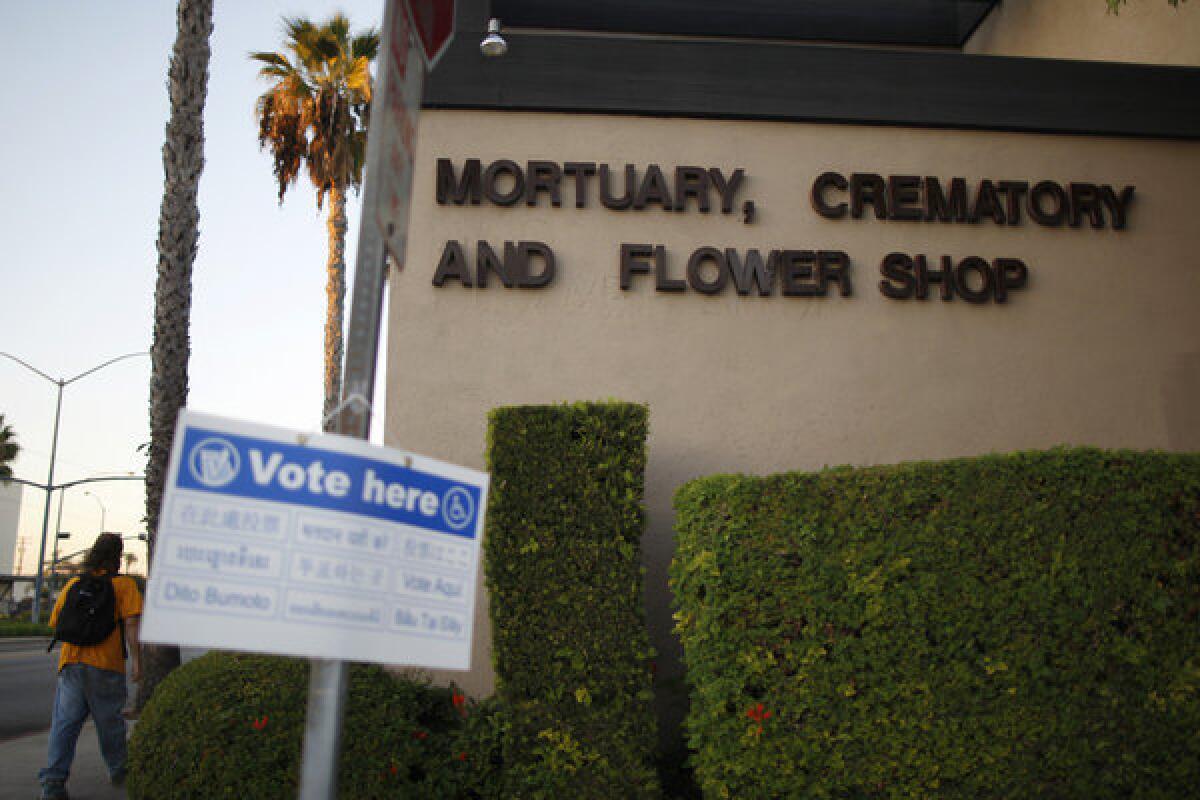Californians say they oppose death penalty, then vote for it

- Share via
For The Times’ editorial board, Tuesday’s election contained a lot of victories: 15, to be precise. That’s the number of ballot measures or candidates endorsed by The Times that emerged victorious, compared with just four races in which our picks lost. But one of the losses was particularly tough, given that it was on an issue this paper’s editorial page has been backing since the early 1970s: replacing the death penalty with a sentence of life without parole.
Backers of Proposition 34 can’t be faulted for thinking the time was right for a referendum on capital punishment. Not only is the state wrestling with a gaping budget deficit worsened by the roughly $184 million a year it spends on costs related to the death penalty, but the presidential race was expected to increase the turnout of liberal voters, who are much more likely than conservatives to support the shuttering of death row. Even more to the point, polls indicated that public attitudes toward capital punishment were changing.
The Field Poll has been querying Californians on the death penalty for more than 50 years, and in 2011 there was a notable shift. Although 68% of respondents said they were in favor of keeping capital punishment, a percentage that had fluctuated only slightly since 2002, the answers grew more interesting when the question was phrased a different way. Asked whether they would rather sentence killers to life without parole or the death penalty, a significant majority of Californians in 2011 said they preferred the former -- 48% favored life imprisonment vs. 40% for state-sponsored execution. Since the poll started asking this question in 2000, death had always trumped a life-in-prison sentence.
INTERACTIVE: California election results
Proposition 34 would have done precisely what voters in 2011 said they wanted, resentencing the 726 death row inmates to life without the possibility of parole and eliminating capital punishment as an option in future cases. Yet the initiative lost, 52.8% to 47.2%. What happened?
It’s possible the 2011 poll just wasn’t all that accurate. Or maybe voters changed their minds when the possibility of ending the death penalty wasn’t just theoretical but real. Or perhaps some version of the Bradley effect was at play: Under this theory, white voters are sometimes inclined to tell pollsters they intend to vote for a black candidate even though they don’t intend to do so. Similarly, a voter whose brain tells him the death penalty is a seldom-carried-out waste of taxpayer money that risks the execution of an innocent person -- but whose gut tells him that an eye for an eye is the true definition of justice -- might be inclined to tell pollsters that his brain is in charge. Once in the voting booth, the bile takes over.
The good news is that the Proposition 34 results show that public opinion definitely is changing, even if it’s happening more slowly than many would like. In 1978, 71% of California voters approved an initiative reinstating the death penalty; in that context, the fact that only 52.8% now want to keep it looks like progress. Just as supporters of same-sex marriage learned in 2008, when voters approved Proposition 8 and changed the definition of marriage under the California Constitution to the union of one man and one woman, sometimes you catch the tide of history before it has turned. But it’s still heading in only one direction, and in a few years it’s likely to be battering at the walls of San Quentin.
ALSO:
Brace yourself, Los Angeles -- election day lasts another six months
Subscribe to Dan Turner on Facebook
More to Read
A cure for the common opinion
Get thought-provoking perspectives with our weekly newsletter.
You may occasionally receive promotional content from the Los Angeles Times.






